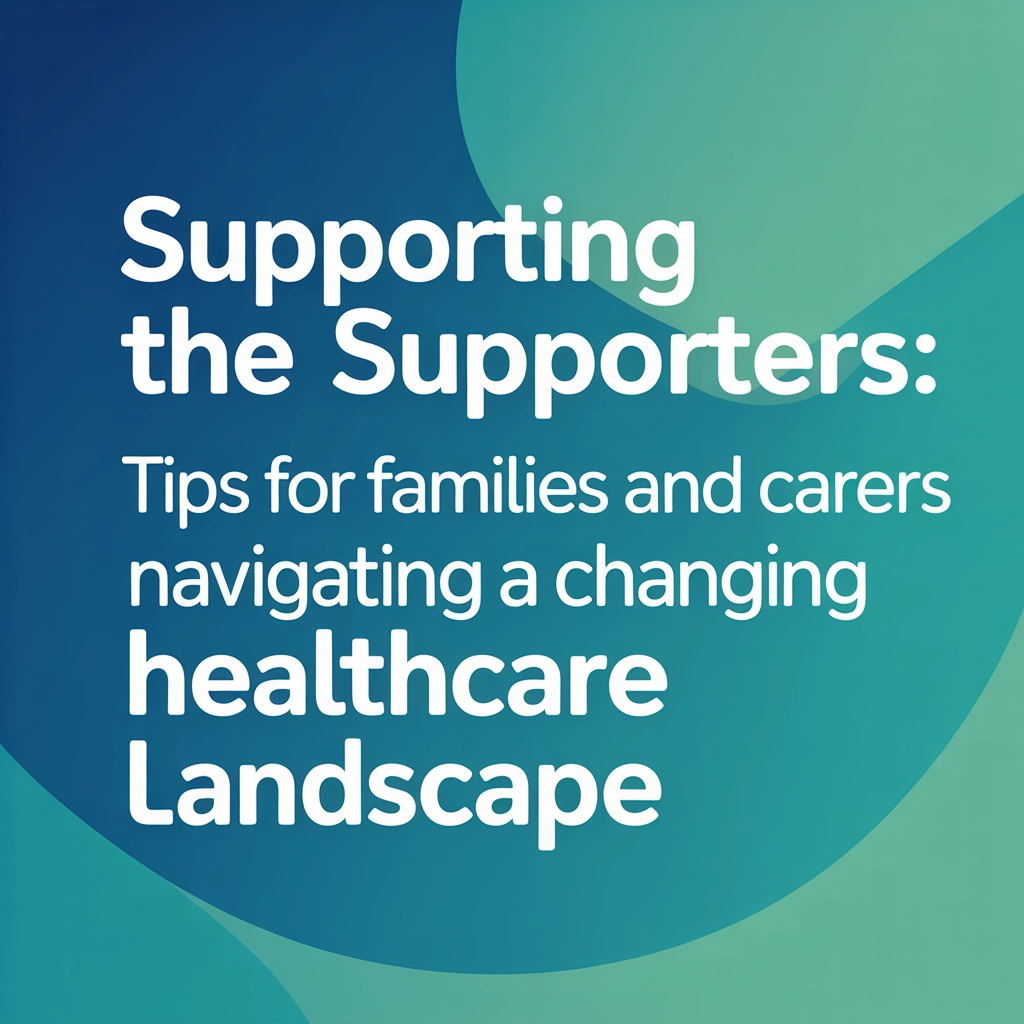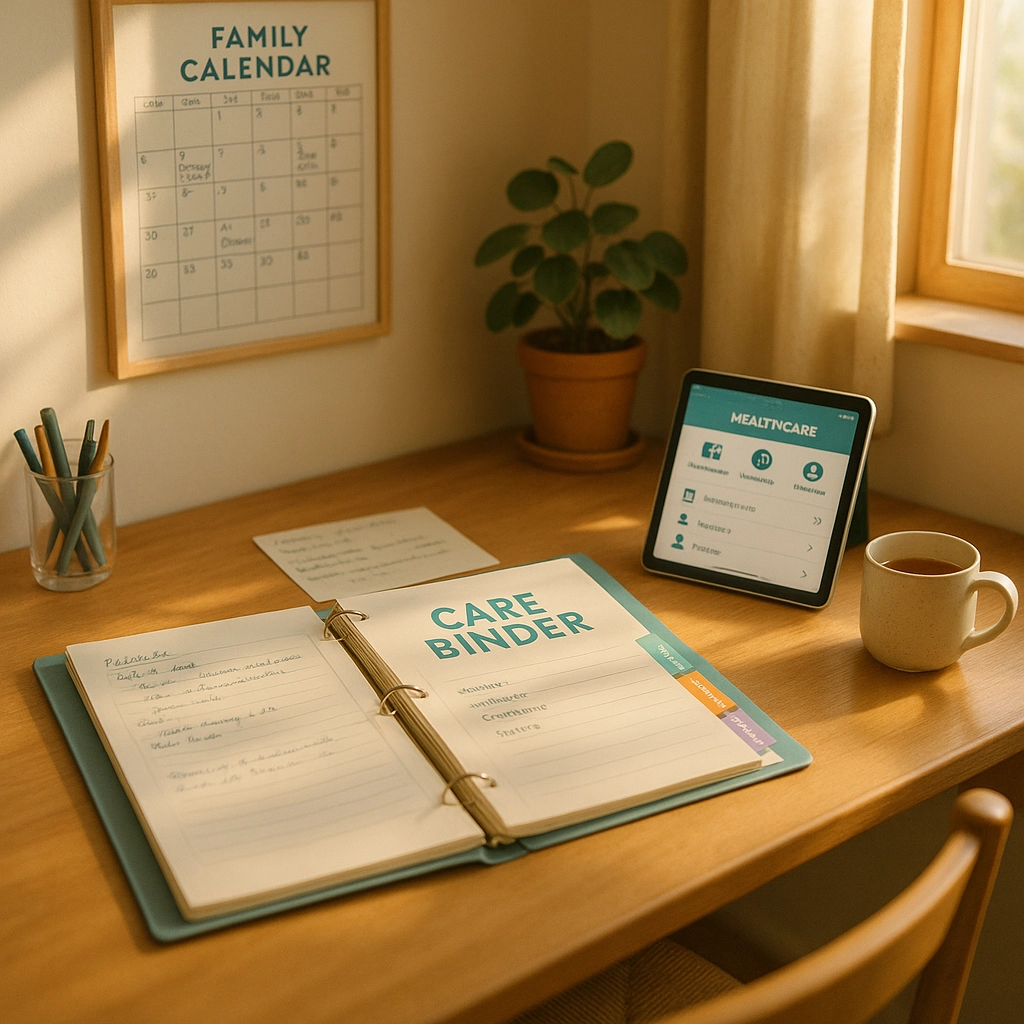Supporting the Supporters: Tips for Families and Carers Navigating a Changing Healthcare Landscape

The Invisible Workforce: Understanding Australia's Carers
When we talk about healthcare heroes, we often picture doctors in white coats or nurses working tirelessly through the night. But there's another group of heroes who rarely get the spotlight – the 2.65 million Australians who provide unpaid care to loved ones with disabilities, chronic illnesses, mental health challenges, or age-related conditions.
At Raya Healthcare, we see you. We understand that behind every person we support is often a network of family members and friends providing countless hours of care, navigating complex systems, and making difficult decisions – all while trying to maintain their own wellbeing.
The healthcare landscape is changing rapidly, with new policies, technologies, and approaches emerging every year. This can make an already challenging role even more difficult to navigate. That's why we've created this guide – to provide practical tips and strategies for those who do so much for others.
The Changing Healthcare Landscape in 2025
The past few years have seen significant shifts in how healthcare is delivered in Australia. Here are some key changes affecting carers:
Policy Changes Impacting Carers
Recent Medicare and NDIS reforms have created both opportunities and challenges for carers. The expansion of telehealth services has made accessing healthcare more convenient, but navigating eligibility criteria for support services has become increasingly complex.
The National Disability Insurance Scheme (NDIS) continues to evolve, with recent changes to funding models and service delivery approaches. Understanding these changes is crucial for carers supporting NDIS participants.
The Rise of Home-Based Care
There's been a significant shift toward home-based care models, with initiatives similar to the international "Acute Hospital Care at Home" programs being adopted across Australia. This trend recognizes that many people recover better in familiar surroundings, but it also places additional responsibilities on family carers.

Self-Care Isn't Selfish: Practical Wellbeing Strategies
Recognizing Warning Signs
Caregiver burnout is real and can creep up gradually. Watch for these warning signs:
- Feeling constantly exhausted, even after sleeping
- Getting sick more frequently than usual
- Feeling irritable or impatient with the person you're caring for
- Losing interest in activities you once enjoyed
- Experiencing anxiety or depression
Building Self-Care into Your Routine
Self-care isn't a luxury – it's essential maintenance for carers. Try these practical approaches:
Micro-moments of self-care: Even 5-10 minutes of mindfulness, stretching, or simply sitting quietly with a cup of tea can help reset your stress levels.
Schedule regular respite: Whether it's through formal respite services or asking another family member to step in, regular breaks are essential. At Raya Healthcare, we offer respite support services that can give you the break you need.
Connect with peer support groups: Sharing experiences with others who understand can reduce feelings of isolation. Online forums can be accessed even during late-night caring hours.
Set boundaries: It's okay to say no to additional responsibilities. Focus on what matters most.
Prioritize your health: Keep your own medical appointments and screenings. Your health matters too.
Navigating Healthcare Systems Effectively
Building Your Healthcare Team
Establishing strong relationships with healthcare providers is crucial. Consider these strategies:
- Identify a point person: Request a designated contact person within each healthcare team to streamline communication.
- Prepare for appointments: Keep a notebook or digital document with questions, observations, and changes you've noticed.
- Request family meetings: For complex care situations, ask for a family meeting with the healthcare team to ensure everyone is aligned.
- Learn the language: Familiarize yourself with key medical terms related to your loved one's condition to help you advocate more effectively.
Coordination Between Services
Coordinating between different healthcare providers can be one of the most challenging aspects of caregiving. These approaches can help:
- Create a care binder: Maintain a physical or digital folder with all medical information, medication lists, and provider details.
- Explore support coordination: NDIS participants may be eligible for support coordination services that can help navigate and connect various supports.
- Use shared digital tools: Ask if providers use shared healthcare platforms or apps that allow for better communication between team members.

Building Your Village: Creating Support Networks
Community Resources
No one should have to provide care in isolation. Community supports can make a significant difference:
- Local council services: Many councils offer carer support programs, transport assistance, and home help services.
- Neighborhood assistance: Consider creating a roster of friends and neighbors who can help with specific tasks like picking up prescriptions or preparing occasional meals.
- Religious and community groups: Many offer practical support for carers in their communities.
- Carer support organizations: Groups like Carers Australia offer information, advocacy, counseling, and peer support.
Training and Skill Development
Caring often involves complex tasks that most people have never been trained to do. Seek out:
- Practical skills training: Ask healthcare providers for demonstrations of any medical procedures you need to perform.
- Online resources: Many condition-specific organizations offer detailed guides and video tutorials.
- Workshops and courses: Look for local or online courses specifically designed for carers.
Financial Navigation: Managing the Economic Impact
Understanding Available Support
Caring can have significant financial implications, from reduced work hours to out-of-pocket expenses:
- Carer Payment and Carer Allowance: Check your eligibility for government financial support.
- Tax benefits: Speak with a tax professional about potential deductions related to caring responsibilities.
- Superannuation considerations: Look into options for maintaining your retirement savings during periods of reduced work.
- Workplace entitlements: Familiarize yourself with carer's leave and flexible working arrangements available through your employer.
Planning for the Future
While focusing on day-to-day needs, try to maintain a view of longer-term financial security:
- Estate planning: Ensure wills, powers of attorney, and advance care directives are in place.
- Long-term care planning: Research options and costs for potential future care needs.
- Insurance review: Check whether insurance policies (health, income protection, etc.) are adequate for current circumstances.

Technology as an Ally: Digital Tools for Carers
Helpful Apps and Platforms
Technology can streamline many aspects of caring:
- Medication management apps: Help track complex medication schedules and remind when it's time for doses.
- Care coordination platforms: Allow multiple family members to coordinate tasks and appointments.
- Telehealth services: Reduce the need for difficult trips to medical appointments.
- Smart home technologies: From medication dispensers to fall detection systems, these can enhance safety and independence.
Digital Literacy Support
If technology feels overwhelming rather than helpful:
- Look for tech workshops: Many libraries and community centers offer free sessions specifically for seniors and carers.
- Ask for help: Don't hesitate to ask healthcare providers, younger family members, or community services for assistance with digital tools.
- Start simple: Begin with one tool that addresses your most pressing challenge rather than trying to adopt multiple technologies at once.
Working with Healthcare Professionals: Building Effective Partnerships
Shared Decision-Making
Modern healthcare is moving toward models that value the expertise of both professionals and carers:
- Ask questions: Don't hesitate to seek clarification about treatments, side effects, or alternatives.
- Share your observations: You have valuable insights into day-to-day changes that healthcare providers may not see.
- Discuss priorities: Be clear about what matters most to your loved one and what outcomes are most important to their quality of life.
- Request plain language: Ask for explanations without medical jargon.
Advocating Effectively
Advocating for your loved one is an important part of caring:
- Document everything: Keep records of conversations, recommendations, and concerns.
- Know your rights: Familiarize yourself with patient and carer rights in healthcare settings.
- Bring support: Consider bringing another person to important appointments for emotional support and to help remember information.
- Escalate when necessary: Know how to raise concerns appropriately if you feel your loved one's needs aren't being met.
The Road Ahead: Preparing for Transitions
Caring roles often change over time as conditions progress or improve. Preparing for transitions can reduce stress:
- Regular reassessment: Schedule regular times to assess whether current arrangements are still working.
- Research options early: Learn about next-level care options before they're urgently needed.
- Involve the care recipient: Where possible, include your loved one in planning for future care needs.
- Connect with those who've been there: Speak with others who have navigated similar transitions for practical advice.
We're Here to Support You
At Raya Healthcare, we understand that supporting carers means better outcomes for everyone. Our team is committed to providing services that not only assist those with direct care needs but also support the network of people who care for them.
If you're feeling overwhelmed or simply want to explore how we might be able to lighten your load, please reach out to our team. We're here to listen, understand your unique situation, and work together to find solutions that work for your whole family.
Remember: taking care of yourself isn't an afterthought in your caring role – it's the foundation that makes everything else possible.
